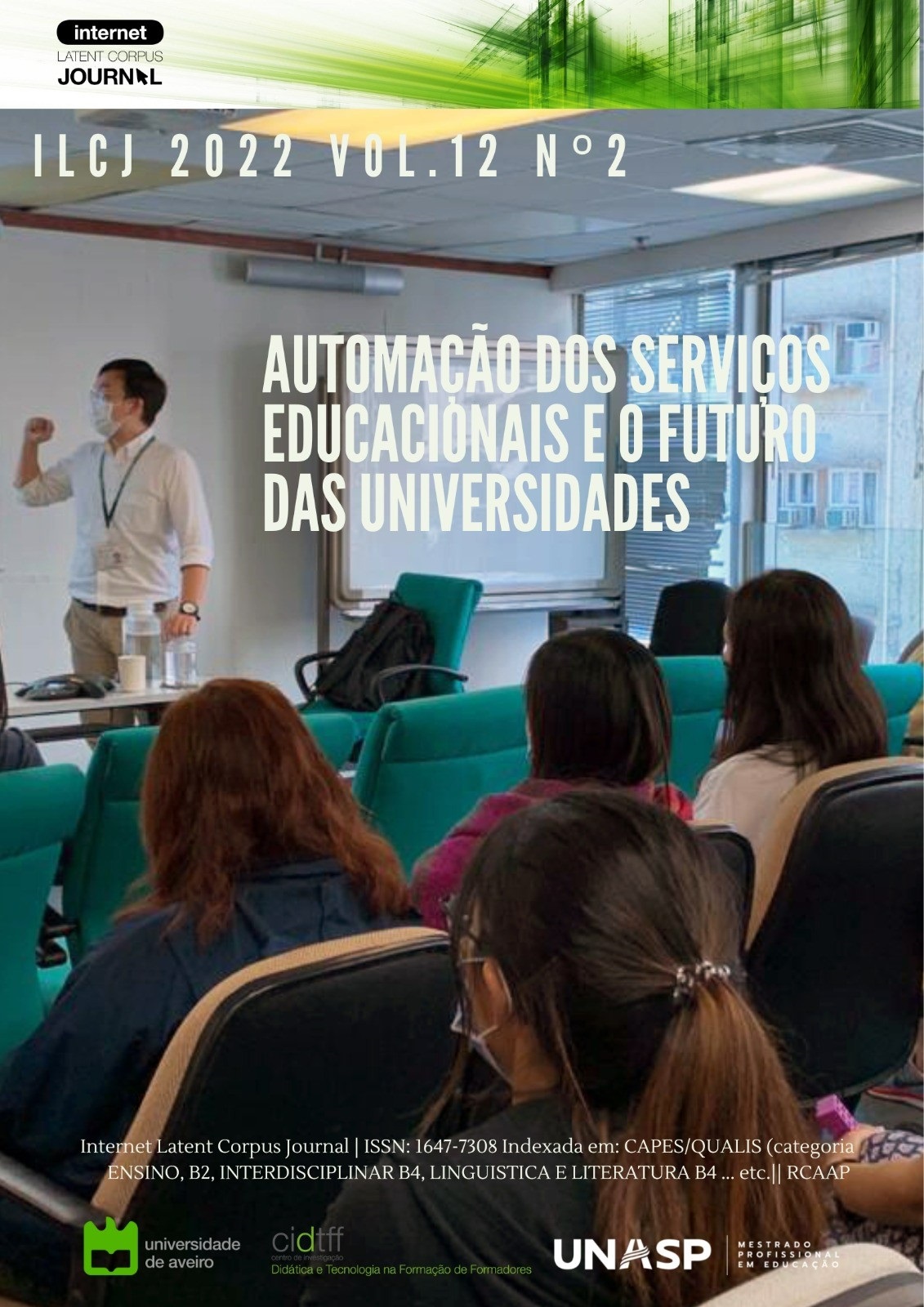INTELIGÊNCIA ARTIFICIAL NA EDUCAÇÃO
UMA REVISÃO INTEGRATIVA DA LITERATURA
Resumo
A Inteligência Artificial (IA) recebeu atenção substancial no século XXI de relevantes interesses comerciais, pesquisadores, governos e o público em geral. No entanto, pouca atenção pública tem sido dada a outras áreas da IA, na política social e, especialmente, na educação. Dado o rápido crescimento da IA, há uma necessidade de entender como os educadores podem utilizar suas técnicas para o sucesso acadêmico dos alunos dentro do ambiente acadêmico, onde muitas vezes não existem equipamento de apoio para uso de recursos tecnológicos nas salas de aulas, já que IA alcançou todas as camadas de nossas vidas, e a educação não está imune aos seus efeitos. Neste sentido, esta pesquisa teve como objetivo conduzir uma revisão integrativa da literatura para mostrar estudos sobre Inteligência Artificial na Educação, e para isso foram acessadas as bases de dados Education Resources Information Center (ERIC), Periódicos Capes e Scielo, utilizando método integrado com os seguintes descritores: Inteligência Artificial and educação (idioma em português para a base de dados periódicos capes e Artificial Intelligence and education para base de dados ERIC e Scielo), no período de 2018 a 2023, nos idiomas: inglês, português e espanhol. A partir da coleta de dados, foram encontrados 67 artigos, sendo 13 utilizados para estudo desse tema. Entretanto foi observado que ainda há poucos estudos sobre inteligência artificial na educação, principalmente no Brasil.
Referências
Borrego, M., Foster, M. J., & Froyd, J. E. (2014). Systematic literature reviews in engineering education and other developing interdisciplinary fields. Journal of Engineering Education, 103(1), 45–76. https://doi.org/10.1002/jee.20038
Chung, J. Y., & Lee, S. (2019). Dropout early warning systems for high school students using machine learning. Children and Youth Services Review, 96, 346–353. https://doi.org/10.1016/j.childyouth.2018.11.030
Costa-Mendes, R., Oliveira, T., Castelli, M., & Cruz-Jesus, F. (2021). A machine learning approximation of the 2015 Portuguese high school student grades: A hybrid approach. Education and Information Technologies, 26(2), 1527–1547. https://doi.org/10.1007/s10639-020-10316-y
Ercole, F. F., Melo, L. S. de, & Alcoforado, C. L. G. C. (2014). Revisão Integrativa versus Revisão SistemáticaEditorial. Rev Min Enferm, 18(1), 1–2.
Ferenhof, H. A., & Fernandes, R. F. (2016). DESMISTIFICANDO A REVISÃO DE LITERATURA COMO BASE PARA REDAÇÃO CIENTÍFICA: MÉTODO SSF. Revista ACB: Biblioteconomia Em Santa Catarina, 21(3), 550–563. www.icaa.pt
Jiang, S., Nocera, A., Tatar, C., Yoder, M. M., Chao, J., Wiedemann, K., Finzer, W., & Rosé, C. P. (2022). An empirical analysis of high school students’ practices of modelling with unstructured data. British Journal of Educational Technology, 53(5), 1114–1133. https://doi.org/10.1111/bjet.13253
Jung, J. S., Park, S. J., Kim, E. Y., Na, K. S., Kim, Y. J., & Kim, K. G. (2019). Prediction models for high risk of suicide in Korean adolescents using machine learning techniques. PLoS ONE, 14(6). https://doi.org/10.1371/journal.pone.0217639
Li, H., Ding, W., & Liu, Z. (2020). Identifying At-Risk K-12 Students in Multimodal Online Environments: A Machine Learning Approach. http://arxiv.org/abs/2003.09670
Li, Y. (2022). Deep Learning-Based Correlation Analysis between the Evaluation Score of English Teaching Quality and the Knowledge Points. Computational Intelligence and Neuroscience, 2022. https://doi.org/10.1155/2022/4102959
Luckin, R., Holmes, W., Griffiths, M., & Pearson, L. B. F. (2016). Intelligence Unleashed An argument for AI in Education. Pearson.
Machado, J. L. de A. (2021). Inteligência Artificial e Educação. Revista Trem Das Letras, 8(1), 1–22.
Moher, D., Liberati, A., Tetzlaff, J., & Altman, D. G. (2009). Preferred Reporting Items for Systematic Reviews and Meta-Analyses: The PRISMA Statement. Annals of Internal Medicine, 151(4), 264–269. https://doi.org/10.7326/0003-4819-151-4-200908180-00135
Pugh, S. L., Krishna Subburaj, S., Ramesh Rao, A., Stewart, A. E., Andrews-Todd, J., & D, S. K. (2021). Say What? Automatic Modeling of Collaborative Problem Solving Skills from Student Speech in the Wild. Proceedings of The 14th International Conference on Educational Data Mining, 55–67. https://educationaldatamining.org/edm2021/
Ramdhani, A., Ramdhani, M. A., & Amin, A. S. (2014). Writing a Literature Review Research Paper: A step-by-step approach. International Journal of Basic and Applied Science, 3(1), 47–56. www.insikapub.com
Sansone, D. (2019). Beyond Early Warning Indicators: High School Dropout and Machine Learning. Oxford Bulletin of Economics and Statistics, 81(2), 456–485. https://doi.org/10.1111/obes.12277
Tavares, L. A., Meira, M. C., & Amaral, S. F. do. (2020). Inteligência Artificial na Educação: Survey. Brazilian Journal of Development, 6(7), 48699–48714. https://doi.org/10.34117/bjdv6n7-496
Tsai, C.-C., Cheng, Y.-M., Tsai, Y.-S., & Lou, S.-J. (2021). Impacts of AIOT Implementation Course on the Learning Outcomes of Senior High School Students. Education Sciences, 11(2), 82. https://doi.org/10.3390/educsci11020082
Vicari, R. M. (2018). Tendências em inteligência artificial na educação no período de 2017 a 2030. In Serviço Nacional de Aprendizagem Industrial. Departamento Nacional. (pp. 1–52).
Wang, C., & An, Y. (2022). Mental Health Education in Primary and Secondary Schools Based on Deep Learning. Journal of Sensors, 2022. https://doi.org/10.1155/2022/9672254
Webster, J., & Watson, R. T. (2002). Analyzing the past to prepare for the future: writing a literature review. In MIS Quarterly (Vol. 26, Issue 2). http://www.misq.org/misreview/announce.html
Yağci, A., & Çevik, M. (2019). Prediction of academic achievements of vocational and technical high school (VTS) students in science courses through artificial neural networks (comparison of Turkey and Malaysia). Education and Information Technologies, 24(5), 2741–2761. https://doi.org/10.1007/s10639-019-09885-4
Yildiz, A. (2021). The relationship between secondary education students’ digital addiction levels and their inquiry skills. Research in Pedagogy, 11(1), 151–164. https://doi.org/10.5937/istrped2101151y
Yildiz, M., & Börecksi, C. (2020). Predicting Academic Achievement with Machine Learning Algorithms. Journal of Educational Technology and Online Learning, 3(3). https://doi.org/10.31681/jetol.773206
Yu, Y., Fan, J., Xian, Y., & Wang, Z. (2022). Graph Neural Network for Senior High Student’s Grade Prediction. Applied Sciences (Switzerland), 12(8). https://doi.org/10.3390/app12083881
Zawacki-Richter, O., Marín, V. I., Bond, M., & Gouverneur, F. (2019). Systematic review of research on artificial intelligence applications in higher education – where are the educators? In International Journal of Educational Technology in Higher Education (Vol. 16, Issue 1). Springer Netherlands. https://doi.org/10.1186/s41239-019-0171-0
Direitos de Autor (c) 2023 Rodrigo Henrique Martins, Helena Brandão Viana

Este trabalho está licenciado com uma Licença Creative Commons - Atribuição 4.0 Internacional.







